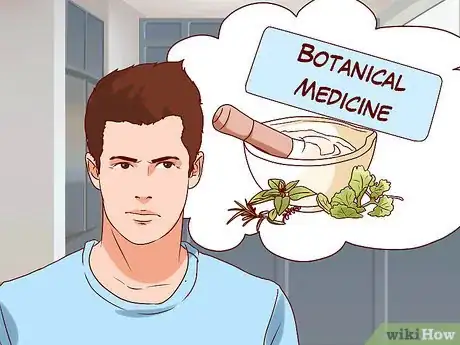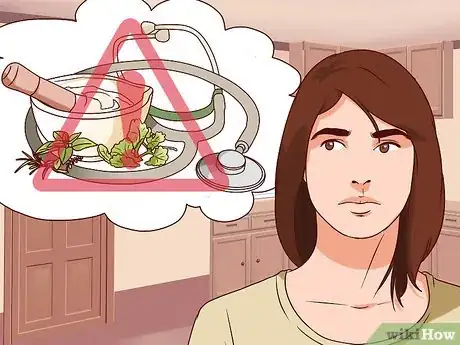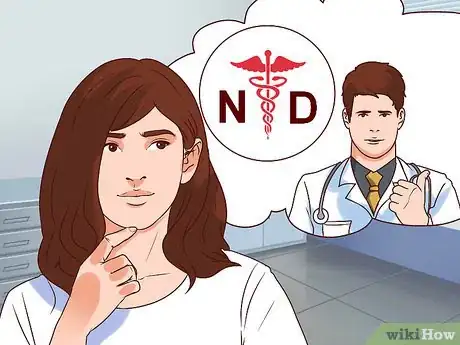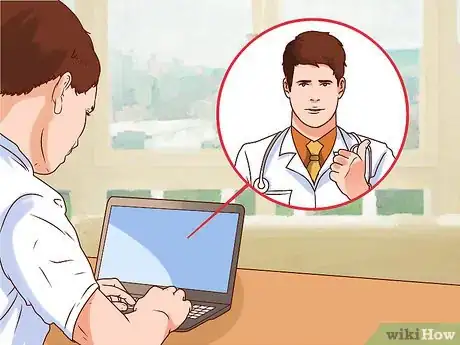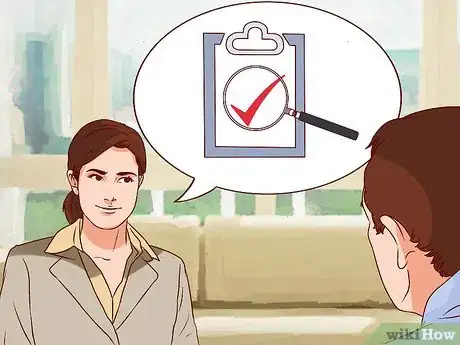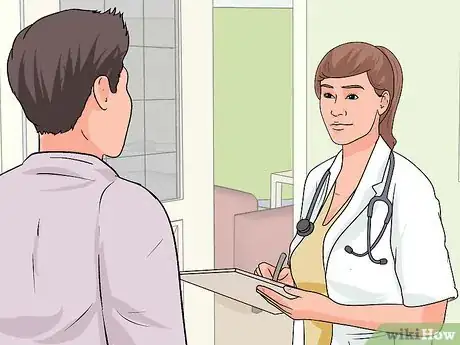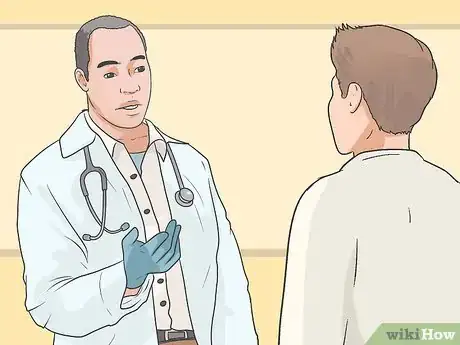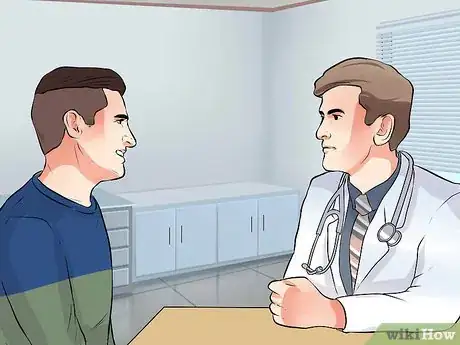This article was co-authored by Zora Degrandpre, ND. Dr. Zora Degrandpre is a Natural Health Doctor and Licensed Naturopathic Physician in Vancouver, Washington. She is a grant reviewer for the National Institutes of Health and the National Center for Complementary and Alternative Medicine. She received her ND from the National College of Natural Medicine in 2007.
There are 14 references cited in this article, which can be found at the bottom of the page.
This article has been viewed 13,659 times.
Naturopathy teaches that the human body can self heal, so naturopathic doctors use holistic, non-invasive treatments to promote healing.[1] While natural treatments work for some, many doctors and scientists question the effectiveness of naturopathy.[2] If you prefer to use natural, holistic treatments, you can find a naturopathic doctor by researching doctors in your area and investigating their practices. However, see your medical doctor for injuries or serious medical conditions and talk to them about your desire to use alternative treatments.
Steps
Deciding if a Naturopathic Doctor is Right for You
-
1Research naturopathy to learn how it works. Before deciding to seek out a naturopathic doctor, read up on the principles and effectiveness of naturopathy.
- Talk to your current healthcare provider. Your current doctor will be able to help you make an informed choice about the potential benefits of naturopathic medicine versus its potential downsides.
- Check the web. Naturopathic practitioners and organisations in many countries have websites outlining the basic ideas of naturopathy. Many of the critiques of naturopathic medicine from the point of view of conventional medicine can also be found online. Take the time to read around the subject and decide what you think.
- Ask your friends, colleagues or family. See if members of your community have experiences with naturopathic healing. Their experience may help you make your own choice.
-
2Find out the laws governing naturopathic treatment in your jurisdiction. The regulations governing naturopathy vary dramatically between countries and regions. In particular, some jurisdictions allow naturopathic practitioners to prescribe drugs and perform some surgery. Find out what the laws in your jurisdiction allow naturopathic practitioners to do.
- In some jurisdictions – such as South Carolina and Tennessee in the US – naturopathic practice is forbidden.[3] Ensure your jurisdiction doesn’t forbid the practice of naturopathic medicine.
- In many places, naturopathic practice is not regulated by law, so anyone can claim to be a naturopathic practitioner. Be careful not to go to a practitioner with no training!
-
3Identify what kind of care you’re looking for. Naturopathic medicine covers a number of different types of treatment. These are known as 'modalities'. Decide which kind of modality suits your needs better, and use this to find a naturopath who focuses on this area of health. There is no set or defined list of modalities which naturopathic medicine encompasses, but here are some common examples:
- Botanical medicine. This is the use of plants to treat or prevent disease, using the purported natural healing properties of plant.
- Homeopathic medicine. This involves the use of very small doses of natural substances to stimulate the body's self-healing abilities. It has been singled out by practitioners of conventional medicine as particularly ineffective.[4]
- Lifestyle counselling. This involves a naturopathic doctor working with you to develop a healthier lifestyle.
-
4Be aware of the risks involved in the type you choose. Because naturopathic medicine offers so varied a range of treatment options, the potential risks vary similarly widely. Search online or ask your current healthcare provider to assess the risks associated with the treatment you are looking for.
-
5Consider the cost of treatment. In most countries, naturopathic treatments are only available if you pay for them yourself. For instance, in the US, most health insurance plans do not cover naturopathy.[5] In the UK, the NHS does not provide naturopathic treatments. Because naturopathic medicine is practiced in many countries and covers such a wide range of treatments, it is not possible to give an idea of typical associated costs. Investigate the cost of the kind of naturopathic care you're looking for, and decide whether you can afford it.
Identifying a Naturopathic Doctor
-
1Consider what kind of naturopathic practitioner you want. In some countries, including the US and Canada, there’s a difference between ‘naturopathic physicians’ and ‘naturopaths’ (also known as ‘traditional naturopaths’).
- Naturopathic physicians train at a naturopathic medical school, and earn ND (‘Naturopathic Doctor’) or NMD (‘Naturopathic Medical Doctor’) degrees. They have more of a background in conventional medicine, and are often subject to more strict professional licensing regulations.
- Traditional naturopaths attend schools with varying curricula and graduation requirements. They are likely to lean more towards more purely alternative therapies. In most places, they are ineligible to practice medicine. If your beliefs also lean towards a wholesale rejection of conventional medicine, a traditional naturopath may very well fit your requirements.[6]
-
2Look for naturopathic doctors on the internet. Most countries and regions have professional bodies which have directories of naturopathic practitioners. Begin your search by looking in these directories for practitioners in your local area. This will help you create a shortlist of potential candidates who are close to where you live.[7]
- A lot of what you're looking for will depend on your personal priorities when looking for a doctor. Decide on your priorities in advance. For instance, consider your views on how far you reject modern, conventional or invasive medical techniques, or what gender you prefer your doctor to be. Once you have decided on these priorities, use them when creating your shortlist.
-
3Ask for references. Talk to other people who’ve used naturopathic doctors, whether from your local community or on internet message boards. They may have useful tips and recommendations about which naturopathic doctor to choose.
- Ask in other kinds of places connected to alternative treatments, such as health shops. These places will often have ties to other alternative healthcare providers, and may be able to point you in the right direction.
- Be sure to ask why the doctor is being referred to you. It’s important that your priorities match up with those of the person doing the referring![8]
-
4Look for personal websites. See if the practices you are investigating have an online presence. If they do, have a look at the website to get a sense of the personality of the doctor and the atmosphere of their practice. This will help give you an initial idea of their personal approaches to medical practice and patient welfare before you go deeper.
Investigating the Practice
-
1Look for appropriate credentials. Because naturopathic regulatory bodies are usually not subject to statutory regulation, the nature and reliability of their qualifications are extremely variable. Research your region's regulatory body or bodies and determine what kind of qualification you should be looking for. If possible, ask others who have used naturopathic doctors which credential-issuing institutions are more reputable.
- A naturopathic physician should have earned a degree in naturopathic medicine from a naturopathic medical school accredited by your jurisdiction’s professional regulatory body for naturopathic education.
- Look for appropriate professional certification. Naturopathic doctors should be licensed by a professional organisation. There are often multiple professional organisations in an area - ask around to find which is the most reputable.[9]
-
2See if you and your doctor are compatible. It’s important that your doctor has a good bedside manner, and that you get on well with them. Arrange a phone call with your prospective doctor to introduce yourself and get to know them. This will help you understand whether or not your personalities, beliefs and approaches to healthcare are compatible.[10]
- Potential topics to cover include how the doctor makes decisions, how far they cooperate with patients in deciding on a course of treatment, and how much they communicate with patients about their issues.
- The specific topics to investigate will of course be determined by your own priorities. Decide in advance what you are looking for most in a healthcare provider, and tailor your questions accordingly.
-
3Ask about the practice’s policies. Find out how long it takes to get an appointment, whether same-day appointments are available, and how long patients have to wait before seeing the doctor. The staff at the naturopathic practice should be able to tell you this important information.[11]
-
4Assess the staff to determine if they’re a good fit for you. A naturopathic medical practitioner will be part of a team, and it’s important to see how good that team is. The most significant factors to consider are their courteousness and their efficiency. As you ask them for other information about the practice, form your opinion about their own reliability.[12]
- If the staff are rude or inefficient, these are warning signs that the practice should be avoided.
- Similarly, if there are problems passing your messages to the doctor or arranging appointments, even if the staff are courteous, this is also a probable red flag.
When to Seek Medical Care
-
1Visit your doctor for broken bones and serious medical conditions. Naturopathic doctors typically can’t do imaging tests like X-rays, MRIs, and CT-scans. Additionally, they can’t prescribe medication, perform surgery, or administer fluids through an IV. That means that you’ll need to get most serious medical conditions treated by a medical doctor. Talk to your doctor or visit an urgent care center or emergency room if you’re injured or may have a serious condition.[13]
- For instance, you’ll need a medical doctor to set and treat a broken bone.
- Similarly, a medical doctor can provide you with the best treatment options for a condition like cancer.
-
2Continue to work with your doctor while seeing a naturopath. While naturopathic doctors can help you maintain your health, you may require additional treatment for certain conditions. This means that it’s best to continue seeing your primary care physician. Tell your doctor that you want to work with a naturopathic doctor and use natural treatments whenever possible.[14]
- Give your doctor the name and contact information for your naturopathic doctor so that they can work together to provide you the best care possible.
- Keep in mind that sometimes you need a medical doctor to diagnose and treat certain conditions.
-
3Ask your doctor about the risks and benefits of alternative treatments. While many alternative treatments are safe for you to use, they’re not always right for everyone. You may be sensitive to certain treatments, and they may not be as effective as modern medical treatments. Talk to your doctor about which treatments you’d like to try so they can help you create a treatment plan that works for you.[15]
- Your doctor can monitor your condition to make sure it's improving.
- If you’re taking medication for your condition, your doctor can advise you on which natural treatments are safe to use with your medicine.
-
4Talk to your doctor before stopping medication you’re taking. If you want to replace your medication with a natural treatment, consult your doctor first to make sure it’s safe to stop taking the medicine. They can help you decide if it’s safe to switch. Additionally, ask them if it’s safe to stop the medication cold turkey or if you need to taper off of it.[16]
- You may experience withdrawal or side effects if you suddenly stop taking your medication. However, your doctor can help you avoid this by slowly tapering you off the medicine.
- Keep in mind that your doctor may recommend you continue taking your medicine if it’s the best treatment option available.
-
5See your doctor if you need to get vaccinated. While not all naturopathic doctors are the same, they typically don't provide pharmaceuticals, including vaccines. If you’re interested in getting vaccinated to avoid infections or to meet travel or school requirements, you’ll need to visit a doctor or clinic. Let them know that you need to get vaccinated.[17]
- If you’re unsure about vaccinations, talk to your doctor to find out which ones they recommend and why.
-
6Check with your doctor before starting a fast. Some naturopaths prescribe fasting as a treatment for certain conditions. While it might seem harmless, fasting can be dangerous for some people, like people who have diabetes or hypoglycemia. Your doctor can help you decide if fasting is safe for you based on your medical history. Talk to them before you try to fast.[18]
References
- ↑ http://bna.gcrn.org.uk/what-is-naturopathy/
- ↑ https://www.ncbi.nlm.nih.gov/pmc/articles/PMC1140750/
- ↑ http://www.naturowatch.org/licensure/laws.shtml
- ↑ http://www.nhs.uk/conditions/Homeopathy/Pages/Introduction.aspx
- ↑ http://health.usnews.com/health-news/health-insurance/articles/2015/03/09/does-your-health-insurance-cover-alternative-medicine
- ↑ https://www.verywell.com/naturopath-naturopathic-doctor-differences-2614941
- ↑ http://www.telegraph.co.uk/lifestyle/wellbeing/healthadvice/4705854/How-can-I-find-a-naturopath.html
- ↑ http://health.usnews.com/top-doctors/articles/2011/07/26/how-to-find-the-right-doctor?page=2
- ↑ https://www.webmd.com/balance/guide/what-is-holistic-medicine#2-4
- ↑ http://health.usnews.com/top-doctors/articles/2011/07/26/how-to-find-the-right-doctor?page=2
- ↑ http://health.usnews.com/top-doctors/articles/2011/07/26/how-to-find-the-right-doctor?page=3
- ↑ http://www.consumerreports.org/cro/2014/09/how-to-choose-a-doctor/index.htm
- ↑ https://www.besthealthmag.ca/best-you/health/what-a-naturopath-can-and-cant-do-for-you/
- ↑ https://www.mayoclinic.org/healthy-lifestyle/consumer-health/in-depth/alternative-medicine/art-20045267
- ↑ https://www.mayoclinic.org/healthy-lifestyle/consumer-health/in-depth/alternative-medicine/art-20045267
- ↑ https://m.kp.org/health-wellness/health-encyclopedia/he.aa104756spec
- ↑ https://m.kp.org/health-wellness/health-encyclopedia/he.aa104756spec
- ↑ https://m.kp.org/health-wellness/health-encyclopedia/he.aa104756spec


